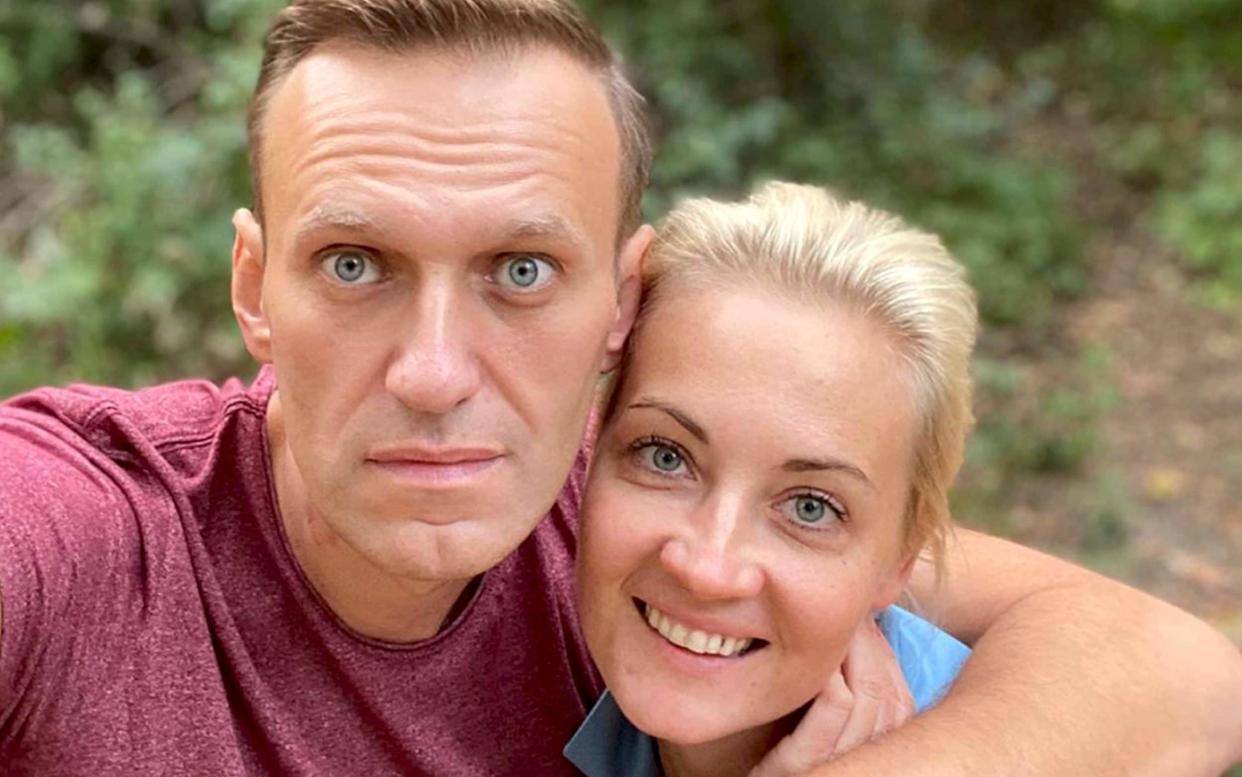Opposition leader Alexei Navalny defies jail threat as he announces return to Russia

- Oops!Something went wrong.Please try again later.
Opposition leader Alexei Navalny said he will return to Russia this weekend, after months recovering in Germany from a nerve-agent poisoning, despite the risk he could be arrested on arrival.
Mr Navalny announced he was “coming home” in a defiant social media post on Wednesday, a day after Russian authorities suggested they would seek to imprison him over a seven-year-old conviction.
“It’s never been a question of whether I would return or not,” the opposition leader said. “The fact is that I didn’t leave. I ended up in Germany...for one reason alone: they (Russian authorities) tried to kill me.”
He added: “Germany is a cool country but I didn’t come here because I chose to.”
Russia’s investigative committee have launched a fraud case against Mr Navalny, alleging he syphoned off millions of dollars in donations from his anti-corruption foundation.
And this week, the country’s prison service applied to have Mr Navalny’s suspended sentence from a 2014 embezzlement conviction converted to a real jail term.
The service said he had failed to adhere to the conditions of his suspended sentence by refusing to return to Moscow in late December, while he was still recovering from his poisoning.
Mr Navalny, 44, has dismissed both cases as politically motivated.
“Servants” of the Kremlin were “doing what they always do: fabricating new cases against me,” he said.
“All Putin has left to do is put a massive banner across the Kremlin saying: ‘Alexei, whatever you do, don’t come home’.”
But the opposition activist insisted: “Russia is my country, Moscow is my city, and I miss both of them.”
Mr Navalny, Russia’s most outspoken critic of Mr Putin, fell suddenly ill on an internal flight last August and was briefly treated in a Siberian hospital before being transferred to Berlin at the request of his family.
Laboratory tests showed he was poisoned with Novichok, the chemical that was used against former Russian agent Sergei Skripal in Salisbury.
Mr Navalny and his supporters said Mr Putin was behind the near-fatal attack, a charge the Kremlin has denied. An investigation by the journalism group Bellingcat, using flight and phone data, pointed to the FSB having orchestrated the poisoning.
The opposition activist embarrassed the Kremlin last month with a sting call to a member of the FSB team that allegedly carried out the attack.
The agent confirmed key details of the operation, and suggested the toxin might have been administered via Mr Navalny’s underwear.
Mr Putin at the end of last year admitted Russian agents had been trailing the opposition leader but said if they wanted to kill him they would have “finished the job”.
Mr Navalny has been repeatedly jailed for short periods for his involvement in opposition protests. He has complained of being tailed by security agents for years, and is partially blind in one eye after a green dye was thrown into his face by an assailant in 2017.
Top allies in the opposition movement have also been targeted while Mr Navalny has been out of the country. Lyubov Sobol, who has been running part of his organisation in his absence, was detained after visiting the home of the FSB agent that Mr Navalny called.
On Wednesday, Mr Navalny said he had largely recovered from his poisoning five months ago and was exercising again, after struggling even to stand up and lie down in the days after he was discharged from his Berlin hospital.
“This morning I did push-ups, squats, and even a few burpees (awful things),” he wrote on Instagram. “Then I realised that the moment I had been waiting for had come. It seems that I am almost back to full health and can return home.”
He invited supporters to come to one of Moscow’s main airports to meet him when he lands on Sunday evening. A Facebook event organised by Mr Navalny’s team for his arrival saw hundreds of people sign up within hours.
Mr Navalny rose to prominence during a wave of opposition protests in 2012. Since then, he has built up a huge social media following with his corruption investigations into Russian officials. He was banned from standing against Mr Putin in presidential elections three years ago.

